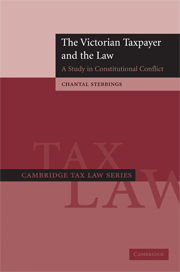Book contents
- Frontmatter
- Contents
- Acknowledgements
- Table of Statutes
- Table of Cases
- List of Abbreviations
- 1 The establishment of the taxpayer's safeguards in English law
- 2 The taxpayer's constitutional safeguards of Parliament
- 3 The administrative safeguard of localism
- 4 Judicial safeguards
- 5 The taxpayer's access to the safeguards
- 6 The taxpayer, the constitution and consent
- Index
2 - The taxpayer's constitutional safeguards of Parliament
Published online by Cambridge University Press: 08 August 2009
- Frontmatter
- Contents
- Acknowledgements
- Table of Statutes
- Table of Cases
- List of Abbreviations
- 1 The establishment of the taxpayer's safeguards in English law
- 2 The taxpayer's constitutional safeguards of Parliament
- 3 The administrative safeguard of localism
- 4 Judicial safeguards
- 5 The taxpayer's access to the safeguards
- 6 The taxpayer, the constitution and consent
- Index
Summary
Introduction
At the beginning of the Victorian age the fundamental safeguard for the taxpayer was the precondition necessary to all taxes, namely that a tax could only be imposed by the express words of an Act of Parliament. Parliamentary consent, laid down unequivocally in the Bill of Rights, was the cardinal rule of English constitutional law to prevent arbitrary taxation by the state. It has been seen that this constitutional principle, once established, was effected by means of procedural rules of parliamentary practice ensuring that a tax measure enjoyed strict and numerous successive stages of free debate in both the House of Commons and the House of Lords, a scrutiny which could be neither attenuated nor abrogated. So fundamental a principle was it that after the Bill of Rights it was never again challenged in substance. Wilde CJ said in 1850 that it had been ‘so often the subject of legal decision that it may be deemed a legal axiom, and requires no authority to be cited in support of it’. Nevertheless the nineteenth century saw the undermining of this safeguard, both substantially and procedurally, through a number of overt statutory reforms of parliamentary process and a more insidious development within the administration of the law itself.
The undermining of parliamentary consent
The role of the executive
Central government desired efficiency and strong control over the administration of taxes.
- Type
- Chapter
- Information
- The Victorian Taxpayer and the LawA Study in Constitutional Conflict, pp. 47 - 76Publisher: Cambridge University PressPrint publication year: 2009



